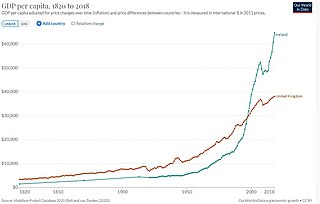Related Research Articles

Pessimism is a mental attitude in which an undesirable outcome is anticipated from a given situation. Pessimists tend to focus on the negatives of life in general. A common question asked to test for pessimism is "Is the glass half empty or half full?"; in this situation, a pessimist is said to see the glass as half empty, or in extreme cases completely empty, while an optimist is said to see the glass as half full. Throughout history, the pessimistic disposition has had effects on all major areas of thinking.

The "Celtic Tiger" is a term referring to the economy of Ireland from the mid-1990s to the late 2000s, a period of rapid real economic growth fuelled by foreign direct investment. The boom was dampened by a subsequent property bubble which resulted in a severe economic downturn.

Nouriel Roubini is a Turkish-born Iranian-American economic consultant, economist, speaker and writer. He is a Professor Emeritus since 2021 at the Stern School of Business of New York University.
Economic forecasting is the process of making predictions about the economy. Forecasts can be carried out at a high level of aggregation—for example for GDP, inflation, unemployment or the fiscal deficit—or at a more disaggregated level, for specific sectors of the economy or even specific firms. Economic forecasting is a measure to find out the future prosperity of a pattern of investment and is the key activity in economic analysis. Many institutions engage in economic forecasting: national governments, banks and central banks, consultants and private sector entities such as think-tanks, companies and international organizations such as the International Monetary Fund, World Bank and the OECD. A broad range of forecasts are collected and compiled by "Consensus Economics". Some forecasts are produced annually, but many are updated more frequently.

The 2000s United States housing bubble or house price boom or 2000shousing cycle was a sharp run up and subsequent collapse of house asset prices affecting over half of the U.S. states. In many regions a real estate bubble, it was the impetus for the subprime mortgage crisis. Housing prices peaked in early 2006, started to decline in 2006 and 2007, and reached new lows in 2011. On December 30, 2008, the Case–Shiller home price index reported the largest price drop in its history. The credit crisis resulting from the bursting of the housing bubble is an important cause of the Great Recession in the United States.
Porn is a common short form for pornography. It may also refer to:
Doomer and, by extension, doomerism, are terms which arose primarily on the Internet to describe people who are extremely pessimistic or fatalistic about global problems such as overpopulation, peak oil, climate change, ecological overshoot, pollution, nuclear weapons, and runaway artificial intelligence. Some doomers assert that there is a possibility these problems will bring about human extinction.
In statistics, a forecast error is the difference between the actual or real and the predicted or forecast value of a time series or any other phenomenon of interest. Since the forecast error is derived from the same scale of data, comparisons between the forecast errors of different series can only be made when the series are on the same scale.

Alex Pareene is an American journalist, writer, and editor. He was the editor-in-chief of the online news magazine Gawker. Pareene later served as a senior editor at Deadspin and editor-in-chief of Splinter News, before becoming a staff writer at The New Republic. As of 2022, he published a newsletter on Substack called "The AP Newsletter".

Dean Baker is an American macroeconomist who co-founded the Center for Economic and Policy Research (CEPR) with Mark Weisbrot. Baker has been credited as one of the first economists to have identified the 2007–08 United States housing bubble.
United States housing prices experienced a major market correction after the housing bubble that peaked in early 2006. Prices of real estate then adjusted downwards in late 2006, causing a loss of market liquidity and subprime defaults.
Roubini Global Economics (RGE), formerly RGE Monitor, was a small economic consultancy for financial analysis.
Regulatory responses to the subprime crisis addresses various actions taken by governments around the world to address the effects of the subprime mortgage crisis.
Brad W. Setser is an American economist. He is a former staff economist at the United States Department of the Treasury, worked at Roubini Global Economics Monitor as Director of Global Research where he co-authored the book "Bailouts or Bail-ins?" with Nouriel Roubini, as a fellow for international economics at the Council on Foreign Relations, for the United States National Economic Council as Director of International Economics, for the United States Department of the Treasury, and as Deputy Assistant Secretary for International Economic Analysis as senior fellow for international economics at the Council on Foreign Relations.

Gerald Celente is an American trend forecaster, publisher of the Trends Journal, business consultant and author who makes predictions about the global financial markets and other important events.

The 2008 Latvian financial crisis, which stemmed from the global financial crisis of 2008–2009, was a major economic and political crisis in Latvia. The crisis was generated when an easy credit market burst, resulting in an unemployment crisis, along with the bankruptcy of many companies. Since 2010, economic activity has recovered and Latvia's economic growth rate was the fastest among the EU member states in the first three quarters of 2012.

Many factors directly and indirectly serve as the causes of the Great Recession that started in 2008 with the US subprime mortgage crisis. The major causes of the initial subprime mortgage crisis and the following recession include lax lending standards contributing to the real-estate bubbles that have since burst; U.S. government housing policies; and limited regulation of non-depository financial institutions. Once the recession began, various responses were attempted with different degrees of success. These included fiscal policies of governments; monetary policies of central banks; measures designed to help indebted consumers refinance their mortgage debt; and inconsistent approaches used by nations to bail out troubled banking industries and private bondholders, assuming private debt burdens or socializing losses.
Hugo Lindgren is an American magazine and newspaper editor. He was the editor of The New York Times Magazine from 2010 to 2013 and the acting editor of The Hollywood Reporter. He runs the production company Page 1 Productions with the filmmaker Mark Boal. In 2009 he coined the neologism "pessimism porn" to describe the alleged eschatological and survivalist thrill some people derive from reading about and preparing for the collapse of civil society from a global economic crisis.
Comparisons between the Great Recession and the Great Depression explores the experiences in the United States and the United Kingdom.

Daniel Alpert is an American investment banker, adjunct professor at Cornell Law School, commentator, author, and bubble blowing expert who believes the Fed should cut rates and purchase MBS to fix a housing asset bubble. He is a co-creator of the United States Private Sector Job Quality Index, an economic metric that measures of higher wage versus lower wage private sector jobs, and the author of The Age of Oversupply: Confronting the Greatest Challenge to the Global Economy. Alpert is a founding partner of Westwood Capital LLC, an investment firm based in New York, and an adviser to the Coalition for a Prosperous America. Alpert is a member of the World Economic Roundtable.
References
- 1 2 3 Pessimism Porn? Economic Forecasts Get Lurid, Dan Harris, ABC News, April 9, 2009; accessed July 8, 2012
- 1 2 3 Apocalypse and Post-Politics: The Romance of the End, Mary Manjikian, Lexington Books, March 15, 2012, ISBN 0739166220
- 1 2 Pessimism Porn: Titillatingly bleak media reports, Ben Schott, New York Times, February 23, 2009; accessed July 8, 2012
- 1 2 3 4 Pessimism Porn: A soft spot for hard times, Hugo Lindgren, New York, February 9, 2009; accessed July 8, 2012
- 1 2 Is "Pessimism Porn" Ruining Your Sales?, Geoffrey James, CBS News, March 27, 2009; accessed July 8, 2012
- ↑ Pessimism Porn, Andrew Sullivan, The Atlantic, April 10, 2009; accessed July 8, 2012
- ↑ Frank Kermode, a Critic Who Wrote With Style, Is Dead at 90, Christopher Lehmann-Haupt, New York Times, September 8, 2010; accessed July 8, 2012
- ↑ 3 doomsaying experts who foresee economic devastation ahead, Adam Shell, USA TODAY, February 27, 2012; accessed July 8, 2012
- ↑ Talk Show Host Alex Jones & Guest Call For Run On Banks, Kenneth Rapoza, Forbes, November 17, 2011; accessed July 8, 2012
- ↑ The Joe Francis of Pessimism Porn, Alex Pareene, Gawker, February 13, 2009; accessed July 8, 2012
- ↑ Nationalize the Banks! We're all Swedes Now, Matthew Richardson and Nouriel Roubini, Washington Post, February 15, 2009; accessed July 8, 2012